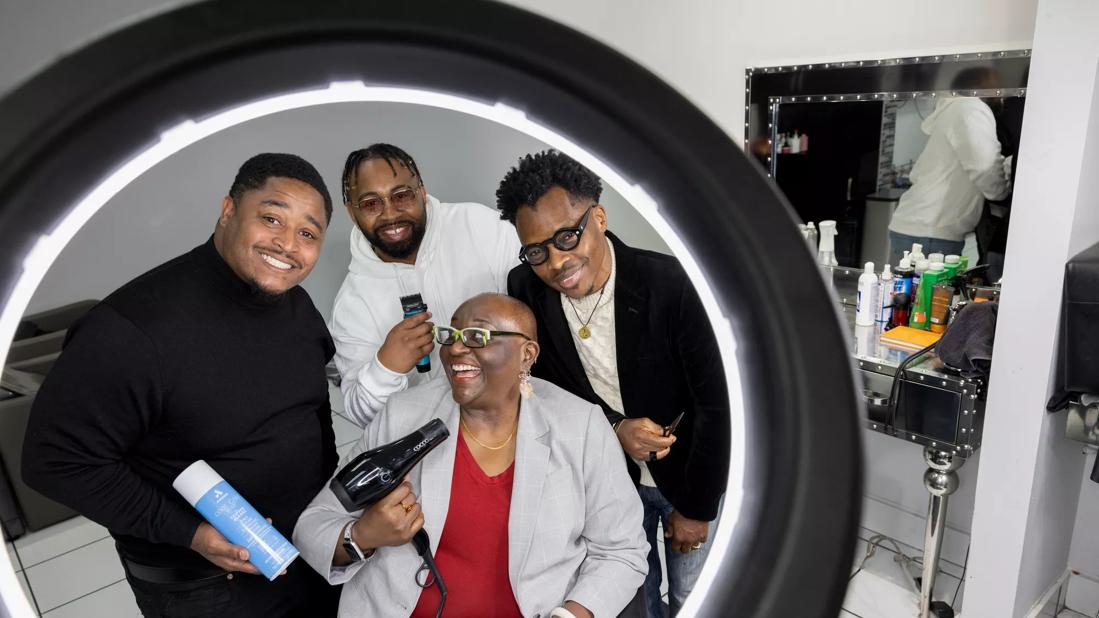Program empowers Black stylists to provide emotional first aid

Pictured above, clockwise from left: Barbers Coddie Wilson and Steven Scarver; podcaster Oluwatoyin "PaPa Tee" Ojeyomi of Resofrik FM; and Cleveland Clinic mental health expert Mary Louise Tatum.
Advertisement
Cleveland Clinic is a non-profit academic medical center. Advertising on our site helps support our mission. We do not endorse non-Cleveland Clinic products or services. Policy
Only one in three African Americans who need mental health care receives it, according to the American Psychiatric Association. Faced with a persistent stigma around mental illness, Black communities suffer disproportionately from social and economic barriers that can lead people to avoid or delay seeking treatment.
Determined to help reverse these troubling trends, Cleveland Clinic therapist Mary Louise Tatum, CNP, has launched a grassroots program aimed at bridging the gap between high-quality psychological care and the unmet mental health needs of Black communities. Funded by a Cleveland Clinic Catalyst Grant, the initiative is focused on formally training barbers in active listening, validation, positive communication, and stigma reduction so they can better support the emotional needs of their Black customers.
Although barbers aren’t expected to diagnose or treat mental illness, Tatum emphasizes that stylists are uniquely qualified to help debunk the stigma associated with such conditions.
“Barbers can play a vital role in improving the lives of men of color,” she explains. “They are in an ideal position to help normalize mental health issues, provide emotional encouragement and inspire their clients to seek help. The barbershop is a safe space for Black men – a place where they can relax, reflect and speak freely. It’s an ideal environment for real talk – and those conversations have the potential to save lives.”
When Tatum initially approached local Cleveland-area barbers to discuss her vision, she was met with apathy and suspicion. With time and perseverance, however, the men’s defensiveness gave way to curiosity – and eventually, understanding. The program is now being taught at the LaBarberia Institute, a barber college in Mayfield Heights, Ohio, and several independent barbershops.
Advertisement
“As a Black woman from East Cleveland – the inner city – I had a lot of confidence in my ability to connect with people in my own community, so I was surprised by how much distrust I encountered in the beginning,” she says. “It took time to build rapport with these men; it was quite humbling.
Tatum’s authenticity and humility eventually helped her earn the barbers’ trust. “And we’ve been rocking and rolling ever since,” she says.
During her early barbershop visits, Tatum quickly realized that the stylists themselves needed help, too. “I knew that before I asked them to help their clients, they needed to learn how to cope with their own suffering,” she says. “Everyone I spoke to had a tough story to share.”
Tatum describes meeting a young barber student who had spent his teen years in prison, noting that Black Americans with psychiatric illnesses, particularly schizophrenia, bipolar disorders and other psychoses are more likely to be incarcerated than people of other races.
“In his own words, he was ‘out of control’ during that time in his life – fighting, scratching and doing anything he could to hurt other people,” she says. “As a result, he spent a lot of time in solitary confinement. He eventually felt comfortable enough with his fellow students to talk about the emotional effect those experiences had on him. The conversation became an opportunity for connection and healing for everyone involved.”
Among Tatum’s chief goals is to teach barbers how to be effective listeners and problem solvers who are prepared to recognize and respond to warning signs and negative coping mechanisms in their clients – and each other. “We want to teach these men how to respond to one another with true intent – to go beyond simple platitudes like, ‘Everything is going to be ok,’” she says.
Advertisement
The classes, all taught by instructors certified in Mental Health First Aid, cultivate mental health champions who can empower their neighbors to prioritize their emotional well-being. After completing the program, participants receive a certificate to indicate their role as mental health advocates.
Tatum, a Psychiatric Behavioral Health Nurse Practitioner, emphasizes that the barbershop curriculum is based on actionable goals like creating an active safety plan that can be given to a person in distress. Barbers are also encouraged to keep mental health referral information on hand and readily share it with their families, friends and clients.
“I tell everyone it’s all about your village and the people you surround yourself with,” says Tatum. “Now I’m part of that village, some of [the barbers] even call me Auntie.”
Inspired by the success of her initial efforts, Tatum has continued to expand the program’s educational curriculum. She recently provided a special course in health literacy designed to teach students how to access care, remove barriers, advocate for themselves, and exercise their rights and responsibilities. In particular, the class emphasized ways to connect with mental health resources.
Plans are already under way for additional courses on alcohol use and smoking cessation – ideas that originated with the students themselves. “Students will offer to walk me to my car after class, where they’ll take the opportunity to share what’s on their mind,” she says. “It’s gratifying to see how engaged they’ve become.”
Advertisement
Tatum has also launched other community health initiatives, including a domestic violence program that provides confidential medical and psychological treatment to at-risk women.
In addition, she is partnering with the Neighborhood Leadership Institute, a local volunteer organization, to create a mental health program designed for disadvantaged youth. Her crew includes a Nigerian business leader and podcaster, a community therapist, and an experienced crisis responder – all of whom were selected for their genuine ability to connect with their students.
Tatum notes that not seeing one’s own culture represented in mental health providers can make therapy seem off-limits and exacerbate distrust. Indeed, only 4% of licensed therapists are Black, according to the American Psychological Association, and even fewer are Black men.
“There’s so much work to be done in our communities — and it’s impossible to do it alone,” says Tatum. “I'm a team person – 100% – and I’ve been lucky to find teammates who believe in the power of this work.”
Tatum routinely takes her mental health message to Cleveland schools, where she hopes she can help create a new generation of mental health advocates.
“If we’re ever going to put an end to cultural poverty, we need to start earlier,” she says. “By the time we’re dealing with adults, we’re already late to the party. Children are the key to long-lasting change that goes beyond racial lines, ethnicity, language and religion. I want to be there with them – at the inflection point.”
Advertisement
Advertisement

Helping patients and providers navigate the pros and cons of common medications and nonpharmacological approaches

Comprehensive treatment harnesses power of pharmacologic and behavioral therapies

Psychiatrist stresses the importance of relationship-building for managing mental illness

Helping patients, families navigate the complexities of psychosis

Consultation service provides comprehensive care for anxiety, PTSD, schizophrenia and other high-risk disorders

Trauma-informed approach helps foster compassionate, individualized behavioral healthcare

Researchers explore the mental and physical benefits of social prescribing

Planning continues with critical, patient-focused input from nursing teams